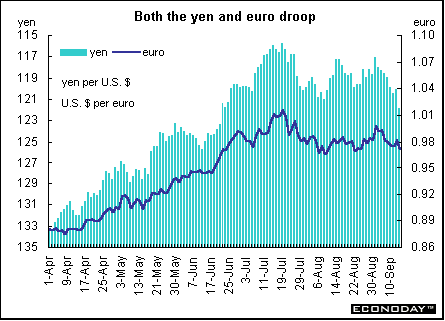
Currencies
The dollar hit its highest level in nearly three months against the yen on Friday following a strong U.S. retail sales report and indications that Japan's policy makers are mulling new policies to ease monetary conditions. The yen's fall may have been provoked by comments from Japan's top financial diplomat, Haruhiko Kuroda, who appeared to accept the prospect that Japan would have to go beyond traditional monetary policy to curb deflation. The euro was swept along with the yen and continued its decline against the dollar as well. An eight-week rally has driven the dollar up from a 2 1/2-year low against the euro and a 17-month low against the yen as evidence mounts that economic growth is stronger in the U.S. than in Europe or Japan. The dollar strengthened last week not only on strong retail sales data but also on a greater-than-expected rise in wholesale inventories. But the yen still remains at a relatively high level against the dollar and this has made Japan's exports more expensive, which in turn has slowed growth in sales abroad.

The dollar for the most part has generally followed the equities markets' ups and downs. But it also has been following economic data. When foreign exchange market players decide that the United States will grow faster than Europe and Japan, the dollar rises against the yen and euro. When U.S. data disappoint, the dollar goes down.
With a week to go, investors are nervous ahead of next weekend's German elections. Latest polls show that Chancellor Gerhard Schroder's SPD-Green government coalition has a slight lead over his conservative challenger Edmund Stoiber. The national election is on Sunday, September 22nd. In case of a hung parliament, the forming of a new government could drag on for weeks, although both Schroder and Stoiber have demonstrated their distaste for such an option (though not ruling it out categorically). The underlying strength in the euro has not helped German growth because of its reliance on external demand.


Last Week's Highlights • Global Stock Market Indexes • Recap of Global Markets • Currencies • Indicator Scoreboard

The Bottom Line • Looking Ahead
|
![[Back To Archive]](../../../images/backtoarchive.gif)